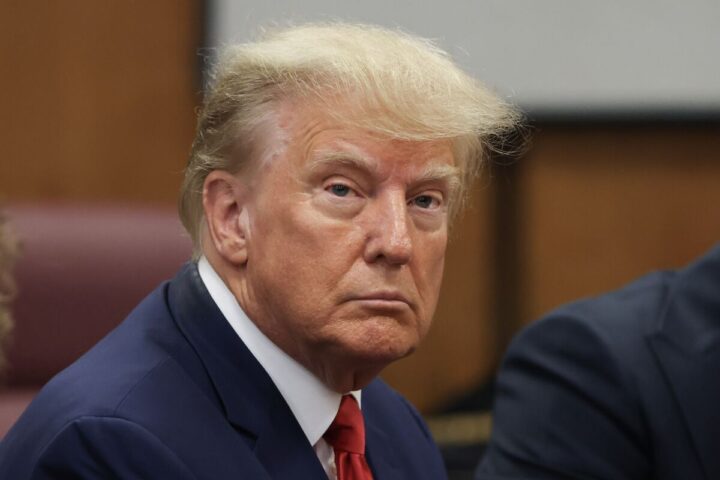The impending launch of Bitcoin exchange-traded funds (ETFs) is generating a buzz, but VanEck advisor Gabor Gurbacs suggests that their initial impact on Bitcoin might be more subdued than anticipated.
In a recent post on X (formerly Twitter), Gurbacs contended that the immediate influence of a Bitcoin ETF might be overestimated, projecting that it could attract around $100 million in net inflows, primarily from institutional investors reshuffling their existing investments.
Nonetheless, Gurbacs is more optimistic about the long-term implications of these ETFs on the Bitcoin market. He drew a parallel with the gold market, recalling how the introduction of gold ETFs in 2004 led to a remarkable surge in gold prices.
Over eight years, gold’s value surged from $400 to $1,800, while its overall market capitalization expanded from $2 trillion to an impressive $10 trillion.
Comparatively, Bitcoin’s current market cap stands at $834 billion, roughly 41% of gold’s market capitalization in 2004.
Gurbacs speculates that once a spot Bitcoin ETF is approved in the United States, it could potentially emulate gold’s growth trajectory but at a much faster pace due to Bitcoin’s fixed supply and periodic halving events.
READ MORE: Major Asset Managers Revise Bitcoin ETF Applications as SEC Deadline Nears
Furthermore, Gurbacs underscores the significance of a Bitcoin ETF in legitimizing and destigmatizing the cryptocurrency in the eyes of institutional investors and nation-states, which could pave the way for substantial investment and adoption.
Eric Balchunas and James Seyffart, ETF analysts at Bloomberg, share Gurbacs’ sentiment.
Seyffart emphasized that many observers are fixated on short-term data points, such as the immediate influx of funds into the ETF upon approval, without fully grasping the enduring impact such a financial product could have.
As for the current state of the Bitcoin market, it is trading at $42,525, having risen 1.1% in the last 24 hours, according to TradingView data.
While some believe that the anticipated ETF approval will trigger a substantial and sustained price increase, others argue that it might be a “sell the news” event, potentially leading to a different market response.
VanEck, a prominent asset manager known for its pending application for a Bitcoin exchange-traded fund (ETF) with the United States Securities and Exchange Commission (SEC), recently unveiled a pro-crypto advertising campaign.
On December 29th, the company shared its “Born to Bitcoin” video on X (formerly Twitter). Interestingly, the video did not explicitly endorse a BTC exchange-traded product.
This move came approximately two weeks after VanEck expressed a preference for “buying and holding” BTC due to the high costs associated with advertising.
In a trend seen among various asset managers seeking SEC approval for spot Bitcoin or Ether ETFs, VanEck’s advertising initiative aligns with an effort to increase public awareness and support ahead of potential approvals.
For instance, Bitwise enlisted actor Jonathan Goldsmith to reprise his iconic “Most Interesting Man in the World” persona in a December marketing campaign promoting Bitcoin.
Similarly, Hashdex introduced an ad spot highlighting the potential use cases of innovative technologies like cryptocurrencies.
READ MORE: JPMorgan CEO Jamie Dimon Under Scrutiny Over Bitcoin ETF
However, VanEck’s advertising campaign faced criticism online, primarily centered on the perceived low production quality of the ad, considering the firm’s substantial assets under management, exceeding $76 billion as of September.
The campaign mainly featured a silhouette of a figure walking in front of a city skyline, with a nod to the iconic “Buy Bitcoin” sign displayed behind Janet Yellen in 2017.
It’s worth noting that, as of the publication date, the SEC had not granted approval for a spot Bitcoin or Ether ETF to be listed on any U.S. exchange.
Nevertheless, the commission had taken steps to allow investment vehicles linked to crypto futures in 2021. Speculation abounded among experts that the SEC might begin approving multiple spot crypto ETFs as early as January 2024.
VanEck’s pro-crypto advertising effort, while not explicitly endorsing an ETF product, reflects the industry’s eagerness to engage with regulators and the public to secure approval for cryptocurrency-based exchange-traded funds, potentially opening up new avenues for investors in the crypto market.
In the midst of the mounting excitement surrounding the potential approval of a spot Bitcoin exchange-traded fund (ETF) in January 2024, certain industry analysts have raised concerns, particularly regarding the issue of backing.
Josef Tětek, a Bitcoin analyst at the hardware crypto wallet firm Trezor, voiced his apprehensions in December 2023, suggesting that spot Bitcoin ETFs might steer individuals away from self-custody, possibly leading to the creation of “millions of unbacked Bitcoin.”
He warned of a scenario where these ETFs could result in what is often termed “paper Bitcoin.”
Tětek’s remarks stirred a significant response within the crypto community, with some dismissing his claims as FUD (fear, uncertainty, doubt), while others pondered the means to ensure that ETF issuers truly hold Bitcoin on behalf of their clients.
Some observers even advocated for the publication of “actual on-chain addresses” in addition to reports on the issuers’ BTC holdings.
David Gerard, the author of “Attack of the 50 Foot Blockchain,” countered Tětek’s concerns, asserting that it was “unlikely” for ETF administrators to create unbacked BTC equivalents or misrepresent their assets.
He emphasized the regulatory oversight and credibility of well-established financial entities, dispelling the notion that unbacked ETF shares were a realistic threat.
However, he didn’t delve into whether clients could independently verify BTC holdings by issuers.
Drawing a comparison to gold ETFs, Bloomberg ETF analyst Eric Balchunas contended that spot Bitcoin ETFs would closely resemble them.
READ MORE: US Prosecutors Hint at No Second Trial for Ex-FTX CEO Sam Bankman-Fried
He pointed out that gold ETFs, having been in existence for two decades, diligently disclose the quantity of gold held by the custodian.
Balchunas emphasized the meticulousness of asset managers, stating they neither desired legal trouble nor wanted the negative publicity that would accompany any failure to hold Bitcoin or any shorting of it.
He also noted that companies like BlackRock and Grayscale were exposed to Bitcoin’s volatility.
The key distinction with spot Bitcoin ETFs, as currently conceived, is that investors would receive cash instead of Bitcoin upon redemption.
Balchunas advised individuals seeking direct ownership of Bitcoin to do so through self-custody, which aligns with the original vision of Bitcoin’s anonymous creator, Satoshi Nakamoto.
He underscored that the vast collective assets in mutual funds and ETFs, amounting to approximately $30 trillion, meant that most investors preferred to avoid direct interaction with the underlying assets.
While many industry observers expressed confidence in the integrity of ETF providers in the cash-create model, others remained convinced that there was a fundamental issue.
According to Tětek, the only way to eliminate concerns of “paper Bitcoin” would be if ETF shares were redeemable for actual Bitcoin.
However, given that the proposed ETFs only allowed for cash in and cash out, investors would have to place trust without the ability to independently verify holdings.
On the final day of consideration by the United States Securities and Exchange Commission (SEC) in January 2024, prominent asset management firms BlackRock, Valkyrie, and Van Eck submitted amended S-1 forms.
These revised documents represent the next step in their quest to establish Bitcoin exchange-traded funds (ETFs) and align with the SEC’s preferences.
Van Eck’s updated application emphasizes that “Authorized Participants” (APs), the financial entities permitted to buy or redeem shares with the Trust, will exclusively transact in cash for both share creation and redemption. This approach mirrors the SEC’s preferred method.
In its updated filing, BlackRock identified Jane Street and JPMorgan Securities as its “authorized participants” for the proposed spot Bitcoin ETF.
BlackRock has consistently advocated for a cash-only model.
Furthermore, the asset manager made history by executing the first trade on JPMorgan’s Tokenized Collateral Network service on October 11.
BlackRock originally submitted its application for a spot Bitcoin ETF in June, followed by Valkyrie’s application a week later.
READ MORE: ARK Invest Liquidates $200 Million in GBTC Holdings, Shifts Focus to Bitcoin Futures ETF
Both firms have actively engaged with the SEC throughout December, attending meetings to discuss their proposals.
Commenting on BlackRock’s amendment, Bloomberg ETF analyst Eric Balchunas noted, “Looks [like] we have our first horse at the starting gate,” alluding to the asset manager’s potential for SEC approval.
Balchunas previously anticipated the SEC’s decision on the outstanding spot Bitcoin ETF filings to occur by January 10, 2024.
If approved, trading could commence shortly thereafter.
Valkyrie, in its updated S-1, also designated authorized participants, namely Jane Street Capital and Cantor Fitzgerald. Additionally, StoneX Financial will assume the role of its lead market maker.
It’s worth noting that a slew of financial heavyweights, including BlackRock, Van Eck, Grayscale, Bitwise, WisdomTree, Invesco, Galaxy, Fidelity, ARK Invest, Valkyrie, Franklin, Hashdex, Global X ETFs, and Pando Asset, have all submitted S-1 applications for spot Bitcoin ETFs.
The outcome of these applications will have significant implications for the cryptocurrency market and its integration into traditional financial systems.
Indonesian authorities have recently taken action against ten Bitcoin mining operations, accusing them of electricity theft amounting to nearly $1 million USD.
The North Sumatra Police Force initiated the crackdown, targeting a multi-site Bitcoin mining operation across various locations in Indonesia.
During the operation, they confiscated 1,134 Bitcoin mining machines, 11 meters of electrical cable, and assorted computer equipment.
The Chief of North Sumatra Police, Irjen Agung Setya Imam Effendi, asserted that the organizers of these mining operations had manipulated electrical circuits to power the extensive number of Bitcoin mining machines.
Effendi demonstrated the tampering, explaining that the electricity was being diverted from the upper part of the PLN box, bypassing the meter, which was improper and illegal.
READ MORE: ARK Invest Liquidates $200 Million in GBTC Holdings, Shifts Focus to Bitcoin Futures ETF
The total loss resulting from these ten cases of electricity theft was estimated to be 14.4 billion Indonesian Rupiahs (IDR), equivalent to approximately $935,666 USD.
This incident follows a high-profile case in China where a government official received a life sentence for facilitating access to electricity for Bitcoin miners.
Yi Xiao, a former vice chairman of the Jiangxi Provincial Political Consultative Conference Party Group, was convicted of abusing power in a Bitcoin mining enterprise.
Xiao had reportedly operated a massive $329 million Bitcoin mining venture under the corporate name Jiumu Group Genesis Technology from 2017 to 2021.
During this period, Xiao, along with other corporate executives, amassed a staggering 160,000 Bitcoin mining machines, which at one point accounted for 10% of the entire electricity consumption of the city of Fuzhou.
His sentence underscores the seriousness with which authorities are addressing illegal Bitcoin mining activities, particularly those involving electricity theft, as these operations can impose significant financial burdens on both governments and utility providers.
On December 29, the contenders in the race for a Bitcoin exchange-traded fund (ETF) spot waited until the eleventh hour to submit their final S-1 form applications.
Throughout the day, these applications trickled into the United States Securities and Exchange Commission (SEC), following earlier submissions by BlackRock, Van Eck, and Valkyrie.
Notable names in the crypto industry, including Invesco Galaxy, Bitwise, WisdomTree, and Fidelity, joined the fray.
In the latest filings, Fidelity, WisdomTree, and Invesco Galaxy revealed their authorized participants. Invesco Galaxy chose Virtu and JPMorgan, while WisdomTree and Fidelity opted for Jane Street Capital.
Interestingly, WisdomTree decided to stick with in-kind share creation and redemption, despite the SEC’s encouragement to switch to cash-based mechanisms.
Furthermore, it seems a price war has ignited among competitors. Invesco Galaxy, for instance, announced a waiver of fees for the first six months and the first $5 billion in assets.
Fidelity, on the other hand, set its fee at 0.39%.
Bitwise, though yet to disclose its authorized participants, mentioned in its S-1 filing that an undisclosed entity expressed interest in purchasing up to $200 million worth of the ETF shares.
READ MORE: Bitcoin Miners Surge: Marathon Digital Tops Trading Charts Ahead of Anticipated ETF Approval
It’s worth noting that several major players in the industry have thrown their hats into the ring.
BlackRock, Van Eck, Grayscale, Bitwise, WisdomTree, Invesco Galaxy, Fidelity, ARK Invest, Valkyrie, Franklin, Hashdex, Global X ETFs, and Pando Asset have all submitted S-1 applications for spot Bitcoin ETFs.
The SEC had set December 29 as the deadline for amendments to spot BTC ETF S-1 filings.
Grayscale made a last-minute submission on December 27 with a new S-3 filing, following the resignation of Barry Silbert from the board of directors.
In this filing, Grayscale announced its intention to convert its Grayscale Bitcoin Trust into a cash-only spot ETF, mirroring similar moves by Van Eck and BlackRock in earlier revisions.
Barry Silbert and his company, the Digital Currency Group, are currently under investigation by the SEC, adding another layer of complexity to the evolving landscape of Bitcoin ETF applications.
JPMorgan CEO Jamie Dimon has found himself under scrutiny from the crypto community following his appointment as an authorized participant (AP) by BlackRock, a move revealed in BlackRock’s updated Form S-1 filing released on December 29.
In the world of exchange-traded funds (ETFs), an authorized participant is an organization granted the privilege to create and redeem shares of the ETF.
BlackRock, in its filing, formally designated Jane Street and JPMorgan Securities as “authorized participants” in its proposed spot Bitcoin ETF application.
Interestingly, this development comes despite Dimon’s public stance against Bitcoin.
Dimon had made his stance clear during a December 6 hearing of the United States Senate Banking Committee.
At that time, he asserted that if he held governmental authority, he would make efforts to shut down cryptocurrencies.
Dimon argued that Bitcoin and other cryptocurrencies primarily serve as tools to facilitate criminal activities. This statement drew sharp criticism from the crypto community.
Critics were quick to point out the apparent hypocrisy of JPMorgan’s involvement as an authorized participant in BlackRock’s Bitcoin ETF.
Silver Zimmermann, a crypto enthusiast, sarcastically suggested, “Perhaps money laundering, tax evasion, criminal participation, and drug trafficking are their business as well.”
Others, like user Sunny Po, questioned JPMorgan’s contradictory positions, asking, “How can JP Morgan do all that after telling Congress and Elizabeth Warren that this is what it’s used for?”
READ MORE: Argentina’s New Government Takes Steps to Legalize Cryptocurrency Holdings
Notably, John Deaton, a pro-XRP lawyer, expressed skepticism regarding Senator Elizabeth Warren’s stance on Bitcoin and raised concerns about JPMorgan’s willingness to associate with Bitcoin despite its negative characterization as a tool for criminals.
Deaton questioned whether this was an attempt to mislead the public or engage in gaslighting.
Despite Dimon’s publicly stated opposition to the digital asset sector, JPMorgan made surprising moves in the crypto space.
The bank recently introduced JPM Coin, its own cryptocurrency token, operating on a private version of the Ethereum blockchain, catering to its institutional clients.
Furthermore, JPMorgan launched a blockchain-based tokenization platform in October, with BlackRock counted among its clients.
The bank also participated in a $65 million funding round for Ethereum infrastructure firm Consensys in April 2021.
In summary, JPMorgan’s involvement as an authorized participant in BlackRock’s Bitcoin ETF has ignited controversy within the crypto community, given Jamie Dimon’s previous negative statements about cryptocurrency.
This development has raised questions about the bank’s stance on Bitcoin and its motivations for engaging in the crypto space.
ARK Invest has taken the lead by filing its final Form S-1 amendment for its proposed Bitcoin exchange-traded fund (ETF), putting itself in contention for early approval.
The United States Securities and Exchange Commission (SEC) recently set a crucial deadline for ETF applicants to submit their final S-1 amendments by December 29, 2023, with the expectation of making initial decisions in January 2024.
During a meeting held on December 21, SEC officials met with representatives from seven firms, emphasizing the significance of meeting the deadline.
It was made clear that failure to do so would exclude applicants from the initial round of potential spot Bitcoin ETF approvals early next year.
On December 28, ARK Invest made a pivotal move by filing an amendment to the S-1 registration statement for its Ark 21Shares Bitcoin ETF.
Bloomberg ETF analyst Eric Balchunas highlighted that the amendment focused on authorized participants.
This came after ARK had already revised its application on December 19 to adjust cash creations and redemptions for shares in its fund, aligning with industry trends.
READ MORE: Chinese Authorities Bust $2.2 Billion Crypto Underground Banking Operation
Interestingly, other ETF issuers have been relatively quiet in terms of amended Bitcoin ETF filings, which has raised speculation.
Balchunas suggested that some firms might be waiting until the last minute to avoid revealing their amendments to competitors.
With more than a dozen companies vying for approval of a spot Bitcoin ETF, it is anticipated that additional amended S-1 filings will be submitted within the next 24 hours.
Nate Geraci, president of ETF Store, commented on the growing activity in anticipation of spot Bitcoin ETFs launching in January.
He noted the positive aspect of this saga, which is that it is compelling traditional finance (TradFi) investors to delve into the world of cryptocurrency and prompting crypto investors to familiarize themselves with ETFs.
This convergence, he dubbed “The Bridge,” underlines that crypto is here to stay, with the potential to reshape the financial landscape.
ARK Invest, led by Cathie Wood, a prominent institutional asset management firm, has made a significant move in its investment portfolio by liquidating its entire remaining holdings of the Grayscale Bitcoin Trust (GBTC), valued at $200 million.
Bloomberg ETF analyst Eric Balchunas brought this development to light.
From the proceeds of the GBTC sale, ARK Invest allocated approximately $100 million towards an investment in the Bitcoin Futures ETF called Bito.
Nonetheless, industry experts view this move as a temporary measure, with ARK Invest likely seeking a more liquid and diversified investment portfolio.
Consequently, ARK Invest has now become the second-largest holder of Bito, according to Eric Balchunas.
The process of divesting from GBTC began in October, coinciding with Bitcoin’s price reaching $34,000.
At that time, ARK Invest initiated the sale of 100,739 GBTC shares, valued at $2.5 million, from its ARK Next Generation Internet ETF (ARKW). Later, on December 19, the firm sold an additional 809,441 GBTC shares worth $27.9 million.
READ MORE: Bitcoin Price Faces Seasonal Headwinds: BTC Drops to $42,200
In addition to shedding GBTC, ARK Invest also offloaded 148,885 shares of Coinbase, a popular cryptocurrency exchange, amounting to $27.5 million, from its ARK Next Generation Internet ETF.
These actions by ARK Invest are significant, given the ongoing anticipation surrounding the approval of a spot Bitcoin ETF.
Notably, ETF analysts, including Eric Balchunas, have expressed a 99% probability of a spot Bitcoin ETF receiving approval before the deadline of January 10, 2024.
Cathie Wood, the CEO of ARK Invest and a notable advocate for Bitcoin, has been vocal about the likelihood of a spot Bitcoin ETF gaining approval.
During a recent interview, Wood acknowledged that the heightened expectations regarding the approval of spot Bitcoin ETFs could have a short-term impact on Bitcoin’s price.
However, she emphasized the promising long-term outlook for the cryptocurrency market.
Wood’s comments reflect the dynamic nature of the crypto industry and the significant role institutional players like ARK Invest play in shaping its future.
In the lead-up to the anticipated approval of a spot Bitcoin exchange-traded fund (ETF) in early January, the trading volumes of Bitcoin mining company Marathon Digital have surged, propelling it to the top of the charts among U.S. mid and large-cap stocks.
Over the past 24 hours, the publicly traded firm has witnessed an astonishing trading volume of over 105 million shares, surpassing giants like Tesla, Apple, and Amazon, as reported by Yahoo Finance market data.
Additionally, fellow Bitcoin miner Riot Platforms has emerged as the sixth most-traded stock on the charts, with more than 40 million shares exchanged in the last day.
This increase in trading activity on Bitcoin mining stocks coincides with a renewed push by mining companies to expand their operations, with an eye on the expected approval of the spot Bitcoin ETF in January and the Bitcoin halving scheduled for April.
Marathon Digital made headlines on December 19th when it unveiled plans to acquire two mining centers for a staggering $179 million.
This strategic move will augment its current mining capacity by 390 megawatts, supplementing its existing output of 584 megawatts.
Meanwhile, Riot Platforms had made an equally significant investment two weeks prior, acquiring an additional $291 million worth of Bitcoin mining rigs, resulting in its largest-ever increase in hash rate.
READ MORE: FTX Debtors Propose Settlement in Bankruptcy Case over Embed Acquisition
Despite Bitcoin’s impressive growth of more than 163% since the beginning of the year, the shares of Bitcoin mining companies have significantly outperformed the leading cryptocurrency.
Marathon Digital and Riot Platforms have witnessed astounding year-to-date gains of 767% and 452%, respectively, according to data from TradingView.
Notably, the largest publicly traded cryptocurrency exchange, Coinbase, has also experienced substantial gains, soaring by over 450% since the year began.
The year started with crypto-related stocks being popular targets for short trading, likely influenced by the memories of the FTX collapse and other high-profile meltdowns in 2022.
However, those who bet against the crypto sector may have underestimated its resilience, as more than $6 billion worth of crypto-related shorts have been liquidated so far this year.
The surging interest in Bitcoin mining stocks and the broader crypto market indicates a shifting sentiment, with investors increasingly bullish on the future of digital assets and the potential approval of a Bitcoin ETF in the near future.









